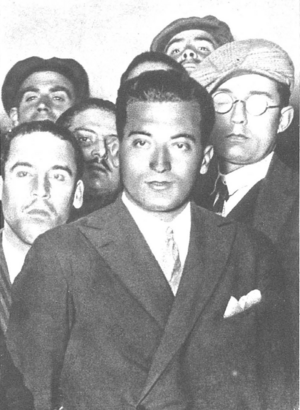Miquel Badia facts for kids
Miquel Badia i Capell (born in 1906, died in 1936) was an important figure in Catalan separatism during the time of the Second Spanish Republic. He was a member of political groups like Estat Català and the JEREC. He also served as the Chief of Public Order for the Generalitat of Catalonia, which is the government of Catalonia.
Contents
Who Was Miquel Badia?
Miquel Badia was born on March 10, 1906, in Torregrossa, a town in the province of Lleida. From a young age, he was involved in Catalan politics.
Early Life and Political Beginnings
In 1925, Miquel Badia took part in a plan by Catalan separatists against King Alfonso XIII of Spain. After this, he faced harsh treatment and spent time in prison.
When the Second Spanish Republic was created in April 1931, Badia became a strong supporter of Francesc Macià. He worked closely with Josep Dencàs. Together, they gained control of the JEREC, which was the youth group of the new Republican Left of Catalonia (ERC) party. This group had special squads known as escamots, who wore olive green shirts. Badia and Dencàs believed in creating a strong Catalan state.
Role in Catalan Politics
In January 1934, Miquel Badia was named the Secretary General of Public Order for the Generalitat of Catalonia. He held this important position for a few months. Later, in June 1934, he was again appointed as the Chief of Services for Public Order. During his time in these roles, he was involved in some conflicts. He eventually had to resign from his position.
Life on the Run
Miquel Badia was involved in an uprising against the Spanish government in Catalonia in October 1934. After this event, he had to escape across the border into France and lived in Paris. In early 1935, he traveled to the Americas, spending time in Colombia and Mexico.
He returned to Europe in late 1935, visiting Nazi Germany in December. He also spent time in Belgium and Andorra. When the Popular Front, a group of left-wing parties, won the 1936 Spanish general election, Badia returned to Catalonia in February 1936. He expected to receive an amnesty, which is a pardon for past political offenses, and he did.
His Final Days
Miquel Badia had been involved in strong actions against anarchists during his time with the escamots and in the Generalitat. On April 28, 1936, Miquel Badia and his brother, Josep Badia, were killed by gunmen from the Federación Anarquista Ibérica (FAI), an anarchist group.
See also
 In Spanish: Miquel Badia para niños
In Spanish: Miquel Badia para niños
 | Aurelia Browder |
 | Nannie Helen Burroughs |
 | Michelle Alexander |


